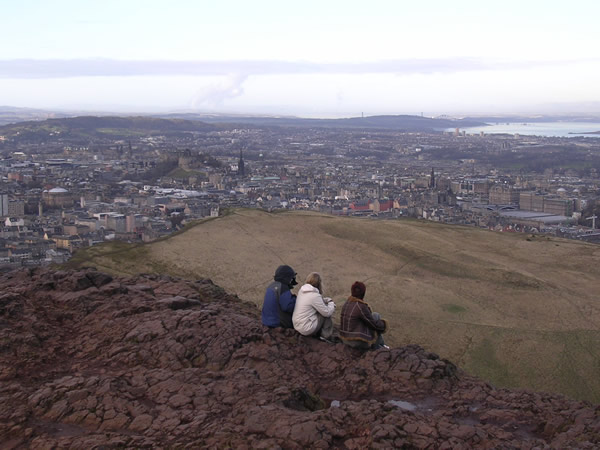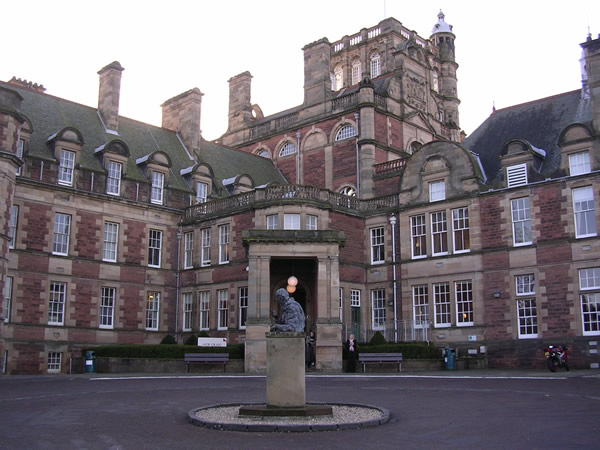|
Student to Student Reports
Travel and Study in Scotland
Finding a Way to Extend Your Stay
Article and photos by Robert Lovik

The first time I walked out of Edinburgh's Waverly Station, I instantly sensed that the four days I had planned to stay would not be enough. Rising out of the station, you first see the majestic Edinburgh Castle, high atop an extinct volcano overlooking the city. The castle's imposing walls lead down into the medieval buildings of the Royal Mile that run down to the Palace at Holyroodhouse. Straight ahead and just below street level are the green fields of the Princes Street Gardens, where locals and tourists stroll beneath the castle in lush surroundings. Immediately to the right of the station's exit is the strange and hypnotic Scott Monument, which appears to be about to launch into orbit. Edinburgh was love at first sight, and before the visit was even over, I was already planning to return permanently.
As an American, getting a visa to live and work in the UK is complex. It takes dedication and a bit of creativity. My first option was foolproof. With two grandparents born in the UK, I figured I was a shoo-in for an ancestry visa. But after spending a few months collecting all the proper documents, I was told by an employee at the UK consulate in Los Angeles I needed to be a citizen of a Commonwealth country like Canada or Australia to qualify for the visa — something they neglected to tell me when I started collecting the documents.
There are, in fact, very few avenues for Americans to obtain a visa to live and work in the UK, but, as with most things in life, where there is a will, there is a way. Having failed to gain an ancestry visa, I returned to South Korea for another year of teaching English. I was buying time until I could figure out a legitimate way to stay long-term in Scotland.
Studying in the UK — The Sure Fire Way to Get Your Foot in the Door
It was not long before it became clear that the only way to get my foot in the UK door was to consider going to grad school in Edinburgh — an exciting option, as I had always wanted to return to school to study journalism. My 20s were coming to an end, and time was a motivator to get a Master's degree. While Edinburgh was undoubtedly my first choice to study journalism, I was open to moving to any of the UK's four countries: Scotland, Wales, England, or Northern Ireland.
As it turned out, there were fewer choices than I had thought. However, I was thrilled to find out that Scotland had two universities with post-grad journalism programs — one in Glasgow and one in Edinburgh. I also found a few cities in England that offered what I sought. Still, with my heart set on Edinburgh, I began contacting Napier University and the head of its journalism department.
Getting a student visa was the first step towards moving to Scotland for more than just the duration of my studies. When living abroad, getting that proverbial first foot in the door can open many others. When I got in touch with the head of the Napier University journalism department, it was a good omen that he was a Canadian. I learned that the application process for foreigners was similar to that of UK citizens. I was told to write an original and timely piece of journalism on a topic of my choosing, provide proof of my bachelor's degree from the University of Iowa, and submit an academic recommendation from a former professor.
Being in South Korea made the process a bit more time-consuming, but it was by no means a hassle. I was surprised at how smoothly everything was going. After having the University of Iowa send transcripts to my Korean address and then forwarding those to Edinburgh, the head of the department reviewed my information and organized a phone interview. My biggest problem with getting accepted was setting up an interview between two busy people living nine hours apart on two continents. The interview itself was a formality. After cruising through the application process, finding a few extra side jobs to raise the money to pay tuition and transportation to Scotland was a matter.

Advantages of the UK Post-Graduate System: Prove You Can Pay
As a foreigner, the tuition you will pay at UK universities is roughly double what locals pay. While this is similar to the frustrating in-state/out-of-state tuition in the US, the increased fees work to the foreigner's advantage. Since the university is getting more money from non-nationals, the entry requirements are less stringent. I discovered this when I moved to Edinburgh, and a classmate was from Cameroon. While his French was exceptional, his written and verbal grasp of English could have been better at best. Like their US counterparts, UK universities are exceptionally accommodating when accepting students with increased tuition.
In addition to that unexpected bonus, heading to the UK for post-graduate study will not put you in the red for years due to a couple of big differences in how UK schools handle their finances. The government heavily funds public universities, which lowers tuition costs, and you may complete most post-graduate programs within a year as opposed to the standard two years in the US. Once accepted into the program, I would have to come up with £7,000 to pay for the course. With the exchange rate at the time being on, that bill came to $14,000 — a fraction of what getting a post-graduate degree in the US would cost and at half the time.
It took nine months to save up enough money to pay for the course and to have enough money to live on until I found a job. UK student visas allow you to work up to 20 hours a week when school is in session and more during holidays. However, I often worked up to 30 hours weekly at a retail store, and no one knocked on my door. The extra hours did not detract from my studies and meant I was able to head to the pub every once in a while with better-off classmates.
From South Korea to Scotland to Study
But, before I could get to Scotland, I had to get that student visa stamped into my passport, which nearly subverted my plan. After setting up an appointment at the British embassy in Seoul, I thought I had obtained all the necessary documents. After waiting in line and paying the fees, I had a brief interview with an embassy employee who is part of the standard application process. I had all my paperwork in order and felt that I had jumped the final hurdle. Then, there was a requirement to show bank statements to prove that I had enough money to support myself while studying in the UK. While I could have gotten these from my US bank, I overlooked this requirement and was weeks away from obtaining the statements.
I panicked. My dream had fallen apart on a mere technicality. I needed more time to reapply for a student visa before I left Korea. But then that is when the useless stamps in my passport popped into my head. With what I had always thought was a waste of time, bureaucratic Korean government requirements had saved the day. In South Korea, whenever you send teaching money earned from your Korean bank to your home bank, the Korean bank must stamp the date and write the amount sent in your passport. I pleaded with the man behind the thick embassy glass to overlook my lack of bank documents and go through my passport. He was aware of this practice in Korea and let everything slide once he saw the transactions documented in my passport. With that crisis narrowly averted, I left the embassy feeling incredibly grateful to one very understanding Englishman. I now had my ticket to the UK in hand.
|
